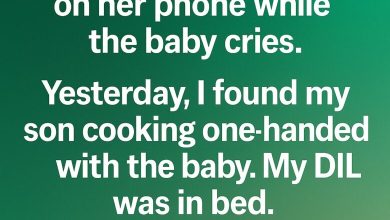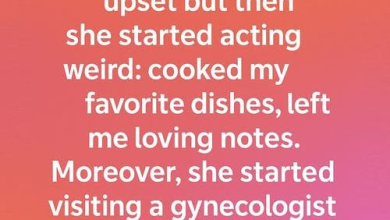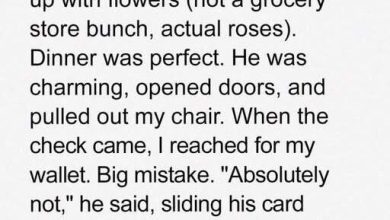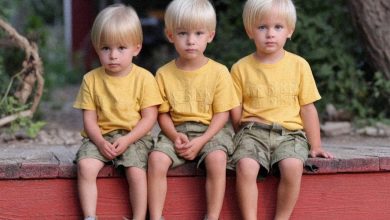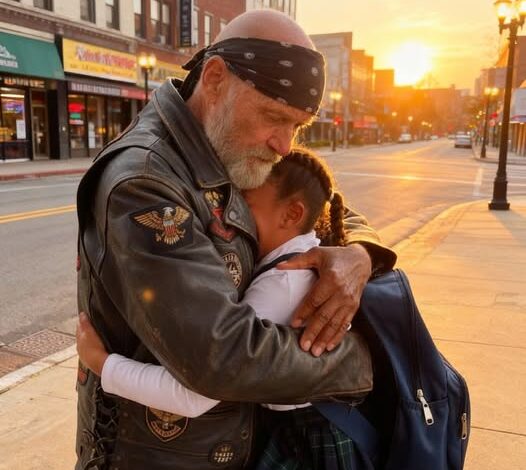
The Little Girl Who Is Not My Daughter but Calls Me Dad, And Why I am There Every Morning
Every morning at 7 AM sharp, I roll my motorcycle to a stop a few houses down from the small blue home where eight-year-old Keisha lives with her grandmother. The engine barely cools before the front door swings open and she comes sprinting out, backpack bouncing, braids flying, yelling “Daddy Mike!” like I’m the best part of her day. Her grandmother stands behind her, one hand on the doorframe, watching with tired but grateful eyes. She knows exactly who I am—and who I’m not. I’m not Keisha’s biological father. I’m not a relative. I’m not a man who planned on having children at all. I’m just the biker who found a terrified little girl on the worst day of her life and refused to walk away afterward.
I met Keisha when she was five. I’d been cutting behind a row of old shops on my way home from work when I heard soft crying coming from near a dumpster. At first, I thought it was a cat or maybe some kid playing around, but the sound had a tremble in it that punched right through my chest. I followed it and found her—small, shaking, and completely alone. She was wearing a pink princess dress that was smeared with blood that didn’t belong to her. Her hands were shaking violently. She kept whispering, “My daddy hurt my mommy… she won’t wake up… please help…”
You don’t unhear something like that. You don’t unsee it either.
I called 911, wrapped her in my leather jacket to keep her warm, and held her while she sobbed into my shoulder. She wouldn’t let go of my hand, not even when the paramedics arrived. As they carried her to the ambulance, she said, “Don’t leave me, angel man.” I told myself it was the shock talking. I told myself she’d forget me by morning.
But I didn’t forget her.
The next day, I drove to the hospital. Told myself it was just to make sure she had someone there. Just to check on her. I ended up staying for hours. And then I went back the next day. And the next. I met her grandmother, a woman in her seventies with a bad hip and the kind of exhaustion that sits permanently in a person’s bones. She was doing her best, but she’d just lost her daughter and suddenly had a traumatized five-year-old to raise. She wasn’t prepared. No one would be.
Keisha clung to me every time I walked into the room. She wouldn’t nap unless I stayed in the chair beside her. She’d wake up crying and reach for my hand like it was the only solid thing in her world. I became part of her routine without trying. Then I became part of her life on purpose.
I called 911, wrapped her in my leather jacket to keep her warm, and held her while she sobbed into my shoulder. She wouldn’t let go of my hand, not even when the paramedics arrived. As they carried her to the ambulance, she said, “Don’t leave me, angel man.” I told myself it was the shock talking. I told myself she’d forget me by morning.
But I didn’t forget her.
The next day, I drove to the hospital. Told myself it was just to make sure she had someone there. Just to check on her. I ended up staying for hours. And then I went back the next day. And the next. I met her grandmother, a woman in her seventies with a bad hip and the kind of exhaustion that sits permanently in a person’s bones. She was doing her best, but she’d just lost her daughter and suddenly had a traumatized five-year-old to raise. She wasn’t prepared. No one would be.
Keisha clung to me every time I walked into the room. She wouldn’t nap unless I stayed in the chair beside her. She’d wake up crying and reach for my hand like it was the only solid thing in her world. I became part of her routine without trying. Then I became part of her life on purpose.
When she was well enough to go home, I visited twice a week. Then three times. Then every day. I’d show up with groceries, fix the rattling window frame, help her grandmother with errands. But most importantly, I just showed up for Keisha. I played board games with her, read to her, helped her work through nightmares and panic attacks, and became the steady presence she had lost overnight.
Six months later, her school held a father-daughter breakfast. Her grandmother didn’t want her to sit alone. So she asked me—awkwardly, nervously—if I would go in her father’s place. I said yes. Keisha spent the whole breakfast grinning up at me like I’d hung the moon.
When the teacher asked her to introduce her father, she stood proudly and said, “This is my daddy Mike. He saved me.”
I opened my mouth to gently fix that, but her grandmother caught my eye from across the room and gave one slow shake of her head. Later she told me the truth: “That child lost everything. If calling you daddy makes her feel secure, don’t you dare take that from her.”
So I didn’t. I let her call me Daddy Mike, and over time, it became something real. Not a replacement for biology, but a replacement for the empty space where safety should’ve been.
As she healed, our routine deepened. I walked her to school every morning because she was afraid of going alone. Some days she chattered the whole way. Other days she asked questions like, “Why did my daddy hurt my mommy?”—questions I couldn’t answer, but I stayed beside her anyway.
Her nightmares didn’t end overnight. She still woke up crying some nights, and her grandmother called me more than once to come sit beside her until she calmed down. I never minded. She needed someone who didn’t disappear. Someone who didn’t hurt her. Someone who cared.
And frankly, I needed her too. Before Keisha, my life was quiet in all the wrong ways. I went to work, rode home, ate dinner alone, watched TV alone, slept alone. I’d spent decades drifting, keeping people at arm’s length. Then this tiny girl with wide eyes and a cracked voice handed me purpose in the most unexpected way.
When her grandmother had a stroke two years later, the state considered placing Keisha in foster care. The thought of her being uprooted again made my stomach twist. So I did what I never thought I’d do at 57 years old: I applied to become her foster parent.
It wasn’t easy. Social workers didn’t know what to make of a rough-looking biker with no parenting experience applying to raise a little girl who’d already suffered more than most adults. But Keisha’s therapist advocated fiercely for us, explaining our bond and how stability with me would help her continue to heal. Her grandmother testified too, her voice shaky but determined: “That man shows up. He loves her. He saved her twice—first physically, then emotionally.”
In the end, the judge granted me temporary custody. I passed every inspection, every background check, every home study. Six months ago, the adoption became official. Papers signed. Last names changed. Heartbeats matched.
Keisha is my daughter now. And I’m her father. No quotation marks. No asterisks.
Our mornings are sacred to her. To both of us. I take her hand and walk her to school just like I’ve done since the day we met. She talks. She dreams. She laughs. She heals. And every time she calls “Daddy Mike!” and sprints toward me, I feel something in my chest unravel and re-knit stronger than before.
People stare sometimes—a white-haired, tattooed biker guiding a little Black girl down the sidewalk—but I don’t care. Let them stare. Let them wonder. They don’t know our story. They don’t know how love can grow out of wreckage. They don’t know how a man with no kids ended up with the most important title of his life: Dad.
Keisha may not share my blood. But she shares my mornings, my heart, and my purpose.
And I’ll be there for her every day—7 AM sharp—for as long as I’m breathing.
